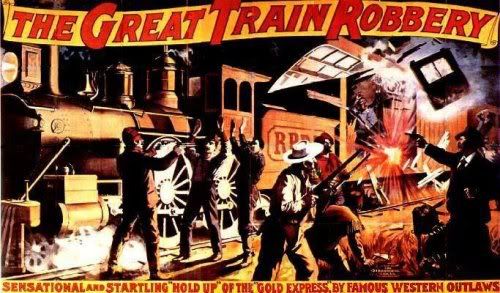The
Great Train Robbery
1903
Director: Edwin S. Porter
Starring: Gilbert M. “Bronco Billy”
Anderson, A.C. Abadie, Justus D. Barnes
The
Great Train Robbery
is one of the earliest examples of the evolution of film from simply filming
everyday events to using the camera to tell a well-orchestrated story. Although it by no means passes muster in
terms of the sensibilities of modern film audiences, it earns its place in film
history for its narrative significance.
Clocking
in at a brisk 12 minutes (and viewable on youtube, should you be curious about
it), The
Great Train Robbery tells a story of, um… a train robbery. But it does so with twelve separate and
distinct scenes, each of which succinctly furthers the plot. Bandits take over a train official’s station,
gagging him, then hijacking the train.
They force the passengers off, stealing their wallets and purses, and
shooting at a passenger who tries to escape, then unhitch the passenger cars
from the train engine. The train
official gets freed of his binds and alerts the sheriff, who then chases down
the bandits. In a final standoff in the
woods, the bandits are killed in a gunfight with authorities. The final shot of the film is the most famous
one: Justus D. Barnes, in full cowboy attire, stares straight into the camera
and fires his gun several times at the screen.
What
I enjoy most about The Great Train Robbery is that it’s one of the first examples
of a film branching out beyond a simple recorded stage play. They did not just go into a theater, set up
the camera, then act out the movie. The
film was shot on location (albeit not in the West – it was shot in New Jersey)
and there are crosscuts between the scenes.
We see the bandits getting away, then cut back to the tied up train
official, then back to the bandits. They
used an actual working train. They use
actual horses in the chase sequences.
There are stunts and special effects.
Although it exists in a vastly simpler form compared to today’s
blockbusters, The Great Train Robbery has all the basic elements of modern
film. It is not just a recording of
daily life. It is not just a recording
of a stage play. It is truly a
movie.
Do
I love The Great Train Robbery?
No. I mean, I can’t. It’s too primitive for me. But I can absolutely appreciate it, and
that’s what I like about it. It has
enormous historical significance, and was wildly successful when it was
released. Apparently audiences back then
loved Westerns and violence just as much as audiences today do.
Arbitrary
rating: Very difficult to rate, because I don’t love it, but I don’t hate
it. It’s an interest piece, an educational
artifact, but not something I’d ever watch for funsies. So… um… 6/10.
Sure. Why not. Watch it!
You won’t be sorry!
